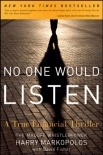No One Would Listen: A True Financial Thriller, Harry Markopolos [graded readers .TXT] 📗

- Author: Harry Markopolos
Book online «No One Would Listen: A True Financial Thriller, Harry Markopolos [graded readers .TXT] 📗». Author Harry Markopolos
That became clear to me on the first day of this trip, June 20, 2002. We spent the day in London. I was jet-lagged and went to my room for a nap. Later that day I met Prince Michel and learned that he had taken Thierry out to the polo fields to introduce him to Prince Charles and his sons, Harry and William. I was told that Prince Michel was somehow related to Prince Charles. It seems to me that the only logical reason for this meeting was to interest Prince Charles in either Madoff or, if he was already invested, our product. That’s certainly a guess and I never found out anything more, although after Madoff surrendered, Prince Charles’s spokesman did say he was not an investor (although if he had invested in Madoff through an offshore fund, it’s unlikely he would have admitted it).
Thierry and Michel told me that they hadn’t invited me to this meeting because I didn’t know how to curtsy. Obviously that was their joke, and so I responded, “Of course I do. But by tradition Americans don’t curtsy to British royalty because they never defeated us on the battlefield. That’s why Americans don’t bow when meeting the Queen.”
I don’t think they liked my joke. I was scheduled to have dinner with the two of them that night but it never happened. In fact, throughout the entire trip, after the last meeting of the day I got kicked to the curb. We didn’t eat a single dinner together. Obviously I was good enough to have breakfast and lunch with them, but I didn’t make the dinner cut. I wasn’t particularly pleased with that, but I was polite enough not to remind them who won the Revolutionary War. We were there to conduct business, as much business as was possible, and if they believed that this was the most effective way to get it done I didn’t care if I had dinner with them.
We had 20 meetings in three countries in 10 days. It was a whirlwind tour of Europe. We met with various hedge funds and funds of funds. The meetings eventually ran together in my memory, but it seemed like each office or conference room was more luxurious than the previous one. The floors were covered with plush Persian carpets; the walls were done in rich walnut and cherry woods, and hung on many of them were oil paintings; we were served only with sterling silver, and the fixtures were gold. These rooms had been decorated to impress clients, to show them that money didn’t matter—which they apparently believed was an effective means of convincing clients to give them their money.
We met with many of the leading investment banks and private banks of Europe. The system there is quite different than here, as wealthy investors use private banks to conduct their business. I went with Patrick Littaye to a meeting with members of the L’Oreal family. At JPMorgan I met with a member of the Givenchy family, who spent considerable time complaining about the Hermès family, who apparently were suing his family over an investment that had soured. At lunch one day with Prince Michel we sat at a table near Mark Rich, the disgraced financier whom Bill Clinton had so controversially pardoned. All these people knew each other. These were the kind of people we were with every day. In Geneva, we were supposed to meet with Philippe Junot, the play-boy who had been married to Princess Caroline of Monaco, but he canceled, I was told, because he thought my strategy was too risky, and he preferred to stay with Madoff.
Thierry began every one of our 20 meetings the same way: “Harry is just like Madoff. It’s an option-based derivative strategy, only he offers a higher risk and a higher return. But it’s different enough from Madoff that you should have him in your portfolio. If you have Madoff and you want some diversification, this will do it.”
And every time he said it I got furious. What I wanted to shout out loud was that I was offering higher returns than Madoff because my returns were real and his were not. And now that I had corrected my math error, I was a lot lower risk, because at most I was going to lose only 50 percent of their money while with Bernie they were going down a full load.
But I didn’t. Instead I smiled and explained how this strategy worked. After that we would drill down to the details. I’d go through my pitch book. Then they would ask the usual range of questions: What are your risk controls? What are your trading rules? What is the frequency of the bad events that can hurt you?
It was the potential risk that scared them. I told them that way less than 1 percent of events could hurt the product, although admittedly should it happen it could be catastrophic. I was honest: “You could lose half your money very quickly.” I didn’t bother to describe the near meltdown Neil and I had





Comments (0)